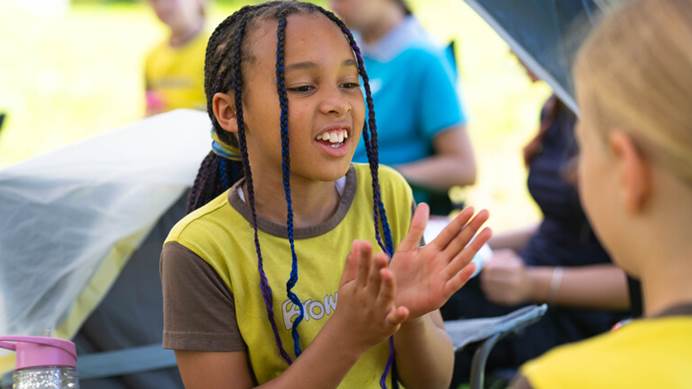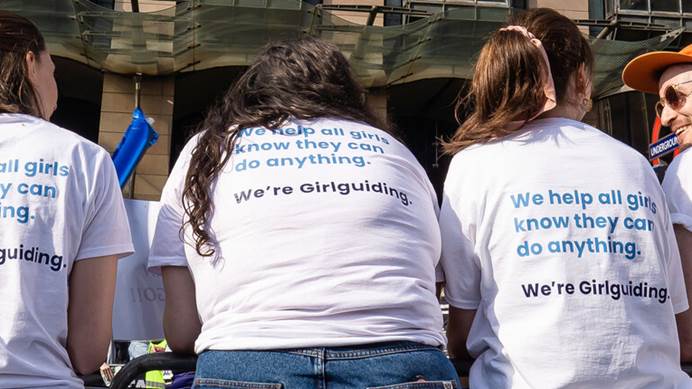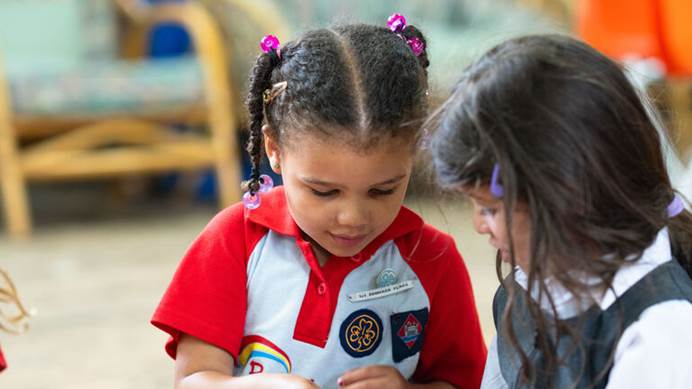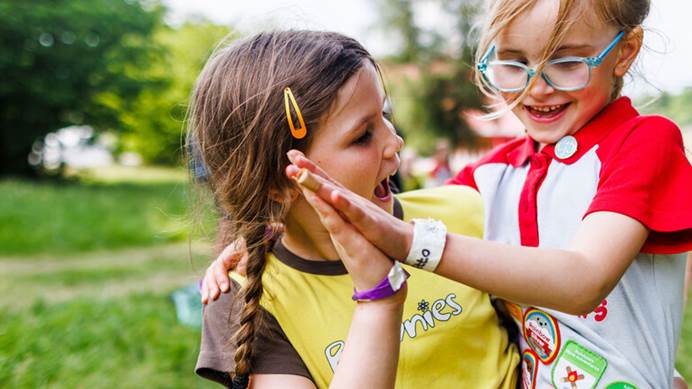Talking to young people about misogyny and online safety
What we're doing to combat sexism and create a safer world for girls - and what you can do to help
If you haven’t yet watched it, you’ve probably at least heard of Netflix’s hit TV show Adolescence.
And with the recent announcement that Adolescence will be made available to stream in all secondary schools across Britain in a government-backed initiative, the show has sparked an important conversation around online safety and misogyny.
The 4-part series follows 13-year-old Jamie Miller, who’s arrested for the murder of his classmate Katie. As the story unfolds, we see how Jamie has been exposed to the so-called ‘manosphere’—a dark online world that fosters harmful attitudes towards women and girls. The show raises themes such as incel culture, cyberbullying, and the impact of online spaces on young people’s attitudes and behaviour.
The reality for girls today
Our own research shows just how real these issues are for girls and young women:
- 1 in 8 (13%) girls aged 13-18 have received sexual threats online—including rape threats—from strangers or people they know. [Source: Girlguiding research around Safer Internet Day 2025.]
- The number of girls (11-21 years) who feel unsafe because of sexism has more than doubled in the last 10 years (from 17% to 47%). [Source: Girls’ Attitudes Survey 2024.]
- 77% of 7–21-year-olds have experienced some form of online harm in the last year, including cyberstalking, seeing unwanted sexual images, and individuals pretending to be someone they’re not. [Source: Girls’ Attitudes Survey 2024.]
These statistics are deeply concerning. No girl should feel unsafe in real life or online. But together, we can take action.
Guidance for talking to young people about misogyny and online safety
It’s not always easy to start conversations about sexism, online dangers, and harmful behaviours. But it’s one of the most important things we can do to help young people navigate these challenges.
Here are some tips to get started:
1. Look after your own wellbeing
Talking to young people about these topics is important. But it's OK to feel like you don't feel prepared, or that you might not be the most appropriate person to have this conversation. There can be a lot of pressure on volunteers, parents or trusted adults to discuss issues with young people that might be potentially triggering for them; we've listed some useful support organisations and resources on this webpage to help you feel prepared.
2. Create a safe space for conversation
Let young people know they can talk to you without fear of judgment. It’s important not to shut young people down if you hear them echoing something they’ve seen or heard online. This will likely not help the situation and could discourage them from opening up again. Take time to listen to their experiences and concerns, ask questions, and reassure them that their feelings are valid.
3. Talk about what misogyny looks like
Explain that sexism can come in many forms - whether it’s comments about how girls or women should behave, expectations around appearance, or harmful online content. Ask them if they’ve ever seen or experienced unfair treatment because of gender and discuss how they felt.
4. Help them spot red flags
Discuss warning signs of harmful online content, such as groups or influencers that spread hate, promote harmful gender stereotypes, or encourage violence. Let them know they can report harmful content on different social media platforms.
5. Encourage critical thinking
Young people are constantly exposed to online messages about gender roles and relationships. Encourage them to question what they see and hear - whether it’s on social media, on TV or films, or from friends.
6. Empower them to take action
Let them know they have a voice. Whether it’s speaking up when they see something wrong, supporting friends, or even joining campaigns that promote gender equality, small actions can make a big difference.
7. Let them know support is available
It’s important for young people to know they’re not alone. If they see or hear something that doesn’t sit right, they can talk to a trusted adult or friend about how they feel. If you have safeguarding concerns about a young member in Girlguiding relating to these topics, you can get in touch with our safeguarding team; check our safeguarding policy for more information.
Supporting conversations around online safety
- Childnet offer support for young people, parents, carers, teachers and professionals on how to encourage online safety.
- Thinkuknow - education programmes catering to different ages and adults about how to stay safe online and offline.
- UK safer internet centre offer support for parents and carers on online safety and dedicated support for young people too.
- Internet Matters for information, advice and support to keep children safe online.
- O2 offer resources for parents and advice on keeping kids safe online.
Supporting conversations around harmful sexual behaviour
- Shore - a safe space for young people worried about their own behaviour or someone else’s behaviour. Includes guidance for if you've shared or been sent a nude.
- Report and remove - this is a website that can help remove nudes from the internet if children have a nude that they're worried has been shared.
- Brook - offer plenty of useful information around the manosphere, cyberbullying, sexting, healthy relationships and online dating advice.
How we’re taking action
At Girlguiding, we’re committed to tackling misogyny and online threats head-on. That’s why we:
- Campaign for change to make a safer world for girls online, in public and at school.
- Work with decision-makers to push for policies that protect young people from harm.
- Spread awareness about the dangers of the ‘manosphere’ and its impact on girls in conversation with decision-makers and at events, and support girls to feed into policy solutions.
- Provide resources for volunteers to make sure all girls, no matter their background, are included in guiding.
- Give girls the skills and confidence they need to navigate the internet safely.
Every girl deserves to feel safe, valued, and heard—both online and offline. To drive real change when it comes to online safety and sexism, we need to reach more girls, inside and outside of guiding, where they are and when they need it.
That's why we’ve been trialling how we offer enrichment activities in schools, such as one-off workshops for girls and issue-specific courses. And we've provided resources to talk to girls about topics such as consent, healthy relationships, gender stereotypes and early warning signs of gender-based violence.
By meeting girls where they are, Girlguiding-inspired experiences will help more girls benefit from the skills and support guiding has to offer. And they’ll be better equipped to deal with the dangers facing girls today.
What you can do to help
1. Talk about it
Having open conversations about misogyny and online safety helps break down taboos and empowers young people to recognise harmful behaviours. Sometimes, a verbal conversation isn’t the best way for a young person to open up. Could you offer another way for them to raise a concern? Maybe you could adapt our communication passports (PDF, 1.4MB) for a particular conversation or topic?
2. Volunteer with us
As a Girlguiding volunteer, you can help girls develop confidence, resilience, and the skills to challenge misogyny. You’ll be playing an essential part in giving girls a safe girl-only space where they can speak out about issues that affect them. Find out more about the different ways you could volunteer, or register to volunteer with us today.
3. Register a child
Girlguiding gives girls a safe space to grow, learn, and stand up against sexism. Our impact report shows that girls in guiding feel up to 23% more confident than the UK average. They might take part in campaigns, learn about advocacy and social action through our programme, become an advocate and talk to MPs and other decision-makers to drive change, and so much more. Find out more about girls making change through guiding, or register a child today.
4. Donate to Girlguiding
If volunteering or registering a child isn't an option for you, you can support Girlguiding and our mission for all girls with a donation. When you donate to Girlguiding, you're investing in girls. Your donation will help us provide a platform where girls' voices are amplified, not silenced. Find out more and show your support by donating today.



